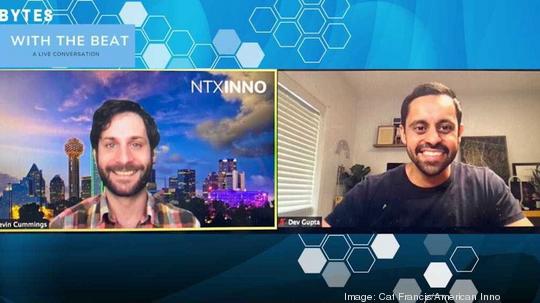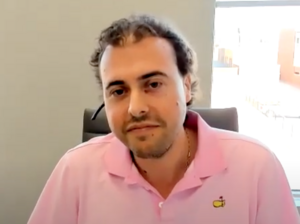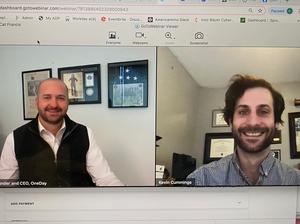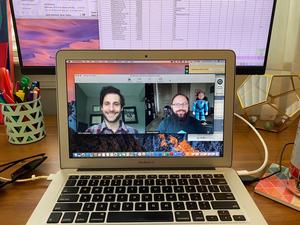
After launching his UX/UI design studio Not Dev in 2007, while teaching at Southern Methodist University, Dev Gupta’s work with big-name clients like Twitter and Google has taken him from Dallas to New York and San Francisco. Now, he’s planting the company’s roots in Dallas.
On Friday, Gupta joined NTX Inno for another installment of the virtual conversation series Bytes With the Beat to talk about what brought the studio back to North Texas, what makes for good design in the new digital age and his thoughts on the local scene as an angel investor.
“Coronavirus is speeding up the move back towards the center of the country. Dallas really has a lot of the business landscape,” Gupta said. “There's just so much activity in terms of corporate, and I think you really need a healthy corporate ecosystem to have a healthy tech and startup ecosystem.”
Gupta said he had always wanted to come back to Dallas after moving to San Francisco to “chase a girl,” who is now his wife. However, the pandemic gave him the push to make a move, especially as he saw the number of companies moving and growing in the region, attracting a larger talent pool. He also noted common tropes like the cost of living and doing business in the area.
So far, Not Dev has grown by word-of-mouth, and it’s looking to continue that from Dallas. To do so, Gupta said the company is looking to bring on new employees, as demand is needed. While he is looking to hire local, those employees would not be working in a physical office as Not Dev has been remote “before it was cool,” something which Gupta jokes stem from his introverted nature.
“Being around people makes me nervous, so it's like I don't want to have to go into an office,” Gupta said. “But I think the more serious answer is I believe in people putting people in the situation that allows them to be the best version of themselves. I believe remote work allows you to do that because it gives you autonomy and control over your schedule.”
Not Dev and Gupta’s move to DFW also means there’s a new angel investor on the scene. In addition to making early-stage, seed-level investments with an office he runs with his brother, Gupta has made investments in a few of Capital Factory’s funds and works with the organization occasionally as a mentor.
He describes the local ecosystem as enterprise-focused, creating practical tools the meet a market need. His investment focus is on tech, and when looking at potential investments, he said having a clear market fit and an expert team are two of the biggest things he looks for.
“Personally, I tend to weigh more heavily the practical side of (the business), the ability to execute, as opposed to the vision. I don't need you to paint me a picture of what it could be in 10 years,” Gupta said.
He shared some other insights during the event (Responses edited for clarity and grammar).
How has the pandemic affected your industry?
The macro trend that has affected what we do is how businesses think about what they're selling, and they're selling software now. So, you need people to help create that software and create the best version of it. Obviously, the pandemic has, you know, changed the way that people and businesses are interacting. The pandemic just accelerated trends that were already happening. The software was eating the world before the pandemic, and it just supercharged it. Suddenly, you had all these people at home who needed to do stuff still, and the best way to do that is using technology. If you didn't see yourself as a software company, I think during the pandemic and post-pandemic, you definitely do. I think everyone now is in the software business.
What do you look for when investing in a company?
I think the focus is so important to a startup because you could go a million different ways, but you don't have the resources to go a million different ways. When you're young, you really have to be clear, focused and deliberate about how you spend your time and your resources. Number two is… technology is the answer. I’ve met with a few startups where they're pitching me the problem, and I don't know if technology is the solution or the problem can be solved using existing technology. It has to be really clear why you need to create new technology to solve this problem. The last one is the team. That's probably the biggest one. I'm really keenly aware of ensuring that you have the right team that can execute on it.
What makes for good design?
Good design is invisible. It works the way that you expect it to work, without thinking about it. The canonical example is a door. No one ever talks about how well-designed a door is. You only think about a door's design when it doesn't work right. To me, at the highest level, good design is invisible. It just works the way that you would expect it to. That’s the core functional aspect of it, but then there's also this aesthetic aspect too. If you were to use the door analogy, there are many lovely doors out there, and people have different tastes and feelings. If you can match that functional aspect, where it works intuitively, with an aspirational aesthetic that meets people where they and elevates that experience, then I think that's when you truly create good design.
If you weren’t able to tune in for Bytes with the Beat this time, you can watch the full conversation below and hear it in Gupta’s own words.








